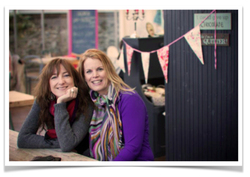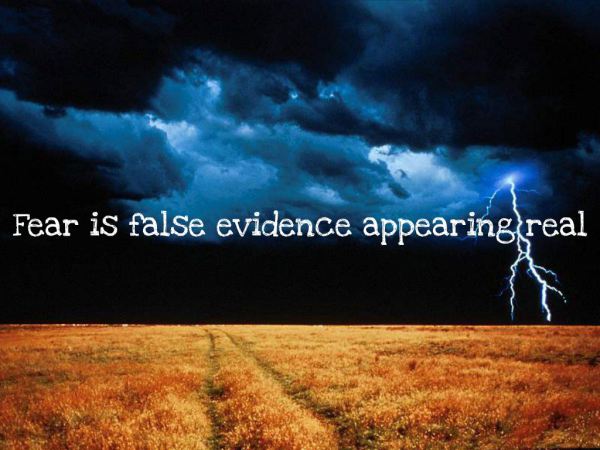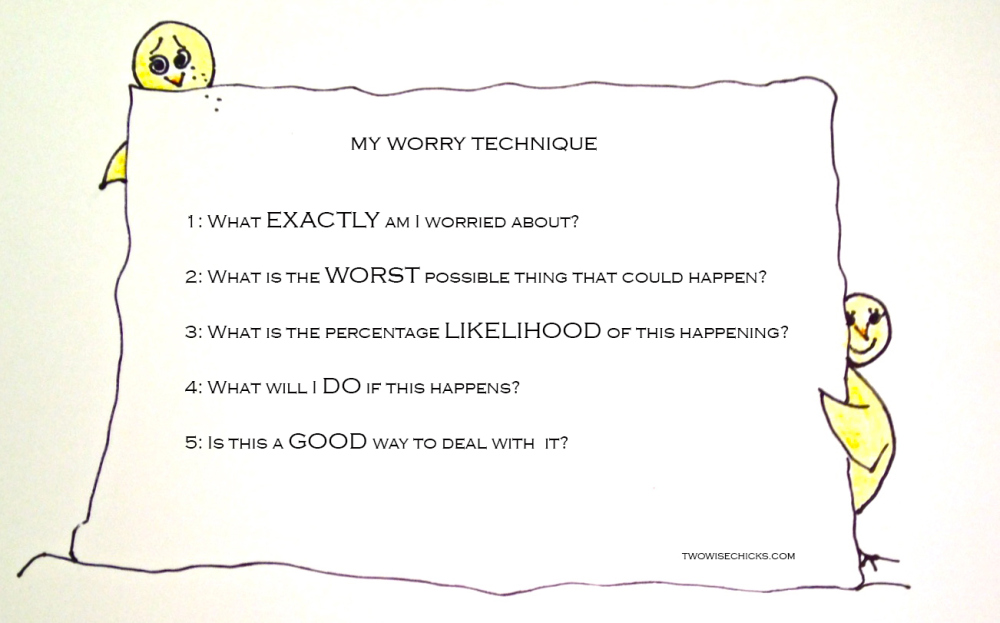|
We’ve seen this acronym for fear flying around the internet and it’s good, as in, it fits: Here’s Sally’s version. It’s rather more dramatic ( much like herself, some would say..). It better captures the 4am-paralyzed-with-fear feeling that can mug us as we half wake. Of course then we’re wide awake, fretting that we won’t get back to sleep, and often we don’t. We tend to ask questions in our head when we worry. We spoke about this in our post about fear. Most of those questions start with “OMG what if etc etc??” or “What will I do if etc etc?” And then the feeling of panic comes up, often pretty quickly, so quickly it feels automatic, out of control. There is much current research that suggest thoughts tend to precede feelings. If we think a fear-based thought we feel afraid. If we recall a happy occasion we feel happier. Others suggest that feelings bring on a cascade of negative thoughts. We tend to think it is probably a combination of both. We respond to happy faces within milliseconds, babies enjoysmiling faces more and look at them for longer than serious or scared faces. We feel better when we see a smile: See? So it follows that if we can control how we think, we’ll have a better chance of controlling how we feel. “Aaaaah don’t worry” If someone we love is worrying we are inclined to say “Ah don’t worry” or “Ah stop worrying, sure that won’t help”. I bet you’ve said that – I bet you’ve had it said to you! And just now have a think back – how helpful was it? If it wasn’t always comforting, did you instead feel annoyed? Maybe even dismissed? Here’s a tip: Don’t tell yourself to stop worrying. Because you can’t – at least not instantly. So you’ll only annoy yourself. We propose a different approach: This approach to worrying might raise a few eyebrows at first. But there is a logic and it’s this: if I tell you now to NOT think about a blue elephant, what do you visualize? Erm… a blue elephant by any chance?? So there is a certain amount we cannot control. However, we’re suggesting you focus on what you can control: how big your elephant is, how many there are, where they are, how noisy they are, what they are doing, even if they’re moving. Similarly telling yourself or someone not to think about the thing they are afraid of, or worrying about, won’t work well. At least not at the beginning, or in a high octane stress environment. And so instead we encourage you to pay attention to their thoughts, and go with, rather than judge and resist them. Attend to, but engage differently with your worry. When you pay attention to your worry thoughts you will notice two things: 1 You ask questions but you don’t answer them 2 You make predictions with neither experience nor evidence. Unanswered questions: Those of you with kids will know that if you want to frustrate a child, let their questions go unanswered. (Tanya will attest to also knowing to how frustrating it is as a parent to ask your children a question and getting no answers). You see, we don’t really grow out of that. We need answers, because we like to feel in control. Predictions: We make fiercely dramatic predictions assumptions and scenarios. They pop into our heads erratically, illogically, and we believe them as if they are real. It all sounds a bit mad, and yet it’s quite normal. We can reign this in though by being more aware of what we are doing and how. Notice and listen to what you are saying to yourself. You’ll see that you very rarely have any evidence to support the non fact that your cracked nail is a sign that you have cancer. Or whatever. When we don’t challenge thoughts, don’t even notice them , they just reappear and replay. That’s what makes us even more anxious, wakeful, stressed, distracted and before long we are feeling the physical symptoms of anxiety. And so here is a ‘worry technique’ to deal with these habits of worrying. This technique is about worrying constructively rather than destructively. It has a beginning and an end. How to use your technique: Answer each question specifically. What am I worrying about? The future? Too big. Right now what exactly is one thing am I worrying about? Maybe it’s exams. Let’s take that as an example. Ok, next what’s the worst thing that could happen? You’ll fail and your life will be ruined and your tutor will literally kill you? No? So maybe the worst is you will fail. Ok. Next: What is the percentage likelihood of this happening? You might want to jump in there with 50% .REALLY?? Use past experience, of failing, evidence, your study level, etcetc. Most 50% answers turn into 5% or less if you really, really think about it rationally. If it’s 0%, move on, you’ve finished worrying and remind yourself of that when it comes back into your head (because it will!!) If it’s more than 0% then next up is What will I do if this happens? So..maybe repeat? Query? Cry, be upset, even angry, talk to friends, maybe a therapist? and so on Last question – Is this a good way to deal with it? If the answer to no4 is “I’ll jump off the cliff and bring the paper setter with me” then the answer to no5 is a resounding no, so go back, figure out no 4 until you have a yes. So by now you have now considered and come up with a solution to the worst possible outcome, even if its grim, even if it’s hard. Any scenario less than worst is not worth devoting time to because you now have evidence that you can create solutions to the very worst. Yay you! So thats’ one way to manage worry type thoughts that has worked for many of our clients. This can be supported with learning how to be generally more mindful. Remember, worry is fear about something that is not actually happening in the moment. The more we can stay in the moment, the more we can stay worry-free. So, check out our ‘Mindfulness Techniques‘ and while you’re at it, our ‘10 Tips for Practicing Gratitude‘. As always – feel free to mail us any of your own tips! We’d be happy to include them :) Originally Posted 11/14/2014 - Link 
0 Comments
Leave a Reply. |
Build Your Action Based Stress Reduction System
Popular PodcastsOlympian Suzy Favor Hamilton - From Fame to Prostitution to Advocacy
Hall of Fame Basketball Star Chamique Holdsclaw on Mental Resilience Diana Nightingale on her husband Earl Nightingale's Principles for Mental Health Success JoAnn Buttaro on Date Rape & PTSD Survival Story: Its Never Too Late Gabe Howard on BiPolar Advocacy Phil Fulmer on Teen Suicide Prison, Bipolar and Mania with Andy Behrman Columbia Univeristy's Dr. Rynn on OCD Archives
March 2018
Categories
All
|








 RSS Feed
RSS Feed





